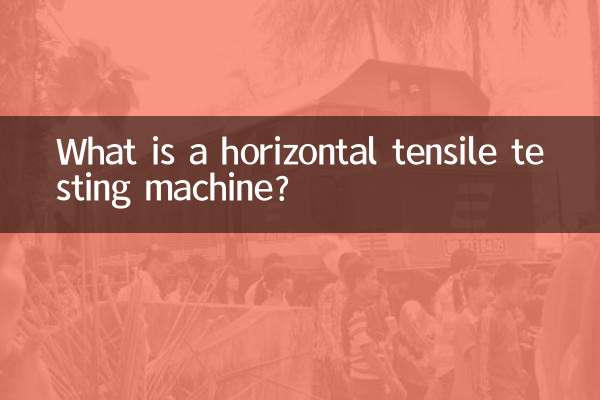What is a small tensile testing machine?
In the fields of industrial manufacturing, materials research, and quality control, small tensile testing machines are common testing equipment used to measure the performance of materials in mechanical property tests such as tension, compression, and bending. This article will introduce in detail the definition, application scenarios, technical parameters and popular models of small tensile testing machines, and combine it with hot topics in the past 10 days to help readers fully understand this equipment.
1. Definition of small tensile testing machine

A small tensile testing machine is a precision instrument used to test the mechanical properties of materials, usually suitable for laboratory or small-scale production environments. It can conduct tensile, compression, tear and other tests on metals, plastics, rubber, textiles and other materials to evaluate key indicators such as strength, elastic modulus, elongation at break and other factors.
2. Application scenarios of small tensile testing machines
Small tensile testing machines are widely used in the following fields:
| Application areas | Specific use |
|---|---|
| Materials research | Test the mechanical properties of new materials and optimize formulas |
| Quality control | Test whether products comply with industry standards |
| educational experiment | Teaching demonstration equipment for universities and vocational schools |
| electronic components | Testing the tensile strength of micro parts |
3. Technical parameters of small tensile testing machine
Different models of small tensile testing machines have different technical indicators. The following is a comparison of common parameters:
| parameters | Typical range |
|---|---|
| maximum load | 0.1kN - 10kN |
| Test speed | 0.001-500mm/min |
| Accuracy level | Level 0.5 - Level 1 |
| Travel range | 600mm-1000mm |
4. Recent hot topics and market trends
According to the hot spots on the entire network in the past 10 days, topics related to small tensile testing machines mainly focus on the following aspects:
| hot topics | focus of discussion |
|---|---|
| Intelligent upgrade | AI data analysis and IoT integration |
| Portable design | Meet on-site rapid testing needs |
| New energy materials testing | New applications such as battery separators and hydrogen fuel components |
| Domestic substitution trend | Domestic brand technological breakthroughs and international competition |
5. Purchase suggestions and precautions
When choosing a small tensile testing machine, you need to consider the following factors:
1.Testing requirements: Clarify material types and testing standards (such as ISO, ASTM). 2.Accuracy requirements: High-precision testing requires equipment of level 0.5 and above. 3.Extended functions: If you need temperature and humidity environment simulation, you need to select the corresponding accessories. 4.After-sales service: Prefer suppliers that provide regular calibration and technical support.
In addition, recent market data shows thatThird quarter of 2023Sales of small tensile testing machines increased by 15% year-on-year, with the proportion of purchases from the education industry increasing significantly.
6. Summary
As a core tool for material testing, small tensile testing machines have continued to grow in technological development and market demand. With the rise of intelligent manufacturing and new energy industries, future equipment will develop towards higher precision and intelligence. Users should choose the appropriate model based on actual needs and pay attention to the latest technology trends in the industry.

check the details

check the details